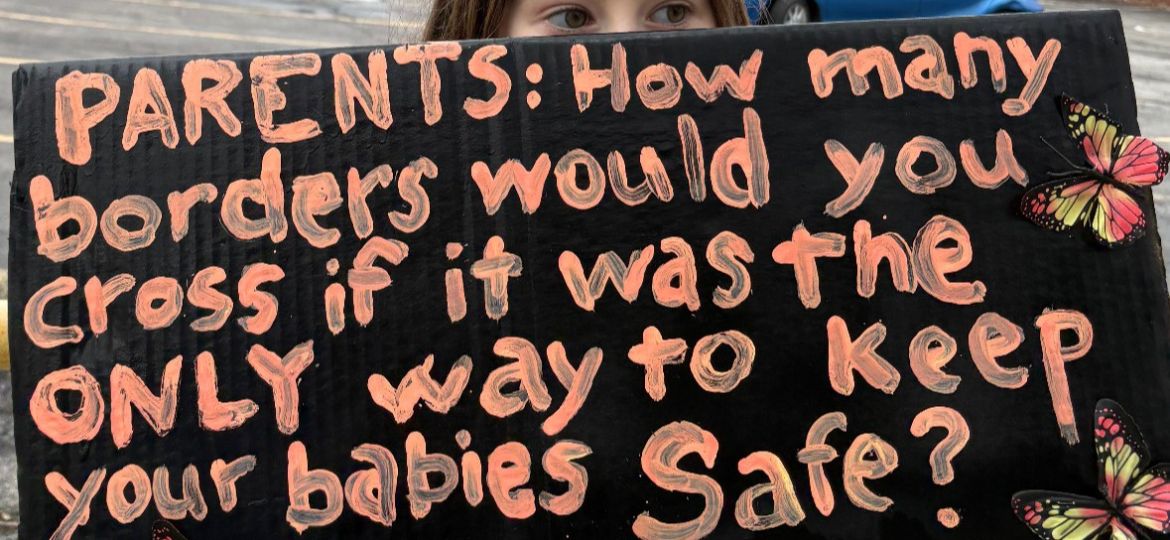
Was it worth it? I asked her in Spanish. “Valio la pena?” It was an impossible question to ask, but I still wondered it out loud. Janet (pseudonym) had no way to answer it, she could only reflect on all she had lost.
Before Janet left Ecuador, she was a small business owner. The businesses in her area started to get threats from a criminal organization. Her neighbor refused to pay the money they demanded, and he was unceremoniously shot three times in the head, in front of Janet and the other business owners near him. She very quickly sold her things and headed for the border. She was traveling with her sister, her cousin, and their four children. They had heard tales of tragedy along that route, but death, or something worse, was certain if they stayed.
On day three of their travels in the Darien Gap, they came upon a river they would need to wade through. It was around 1pm, Janet remembers this because of the way the sun felt when it hit the top of her head as she dipped her shoes into the water. The river only came up to her waist, but the current was strong. She was holding her son Antonio’s hand as they waded through the water, all of their belongings on their backs. Antonio was also holding his 5-year-old cousin’s hand.
Suddenly, Janet slipped into the water. She felt like she would get pulled away but Antonio was able to help her gain stable footing. Yet as she did, she heard her cousin Zandra scream. Janet looked around to see what was going on: Debora, Janet’s 33-year-old sister, was gone. She and her five-year-old were being carried away, down the river. The rest of the family got out of the water as quickly as they could and began running down the river bank. They searched and searched until it was too dark to see.
Janet and her family had been traveling for days. They went from Ecuador to Columbia in a mix of ways—walking, bus, boat, motorcycle. To their surprise, that part of the trip wasn’t even the hard part: the infamous Darien Gap was still up ahead. As they entered the mountainous jungle, their guides left them. So, Janet thought it wise to follow the crowd. Everywhere she went, the Venezuelans somehow seemed to know where they were going.
However, after two nights of going to bed wet and two mornings waking up wet, after their scarce food supply was just about gone, Janet and her family decided to break away from the group. It had been a long night. The group had traversed a steep, muddy terrain in the pitch darkness of the jungle. Every step was uncertain, and the sound of wild animals somewhere nearby was like the soundtrack of their own personal horror movie. While most of the migrants decided to rest a bit longer, Janet and her family, as well as two men from Panama, decided to continue their journey, a decision she would surely regret.
On that third day, in the early afternoon, the river’s current swept Janet’s sister and 5-year-old niece away from everyone they loved. A 15-year-old girl lost her mother and little sister in a matter of seconds, right before her own eyes. Eventually, after searching the area for hours on end, they made the impossible decision to continue on. When Janet came to the end of the jungle, she parked herself there. With each wave of migrants that passed, she searched for her sister’s face, her niece’s little feet. After some time, one of the migrants said they had seen them—but just their bodies, washed up along the river.
At the border, immigration officials gave Janet and her family paperwork and a court date and released them into the US. They were to notify ICE within five days of any address change and were required to check-in with ICE periodically. They were officially in deportation proceedings and would only be allowed to stay if they could successfully prove their asylum claim in court.
As Janet works through the complicated asylum application, prepares for her day in court, and awaits her work authorization, she has had to rely on the NYC shelter system and the kindness of their new church family. Their future is still very unclear.
Janet did what so many people throughout the history of the world have done. When she could no longer stay, she left.
How many borders would you cross if it was the only way to keep your loved ones safe?
No matter what you may believe about the US immigration system or about coming here “the right way,” I think we all have the same answer to this question: I would walk to the ends of the earth and keep going if it meant keeping my family safe.
Far more unites us than divides us. Let us tell the truth, recognize our shared humanity, and courageously stand up for the vulnerable–no matter the cost.
-Catharine Grainge, Director of Advocacy
As a health center, we care for the poorest and most disenfranchised folks in our community. This proximity affords us an expertise on what health for our entire community–no matter your social status–can look like. Our Advocacy Department works to take this information out of our clinics and into the halls of power, to dinner tables, to the hearts and minds of the people. We must understand that what makes one of us sick, can make any of us sick. A just and compassionate community lifts everyone toward wholeness.

